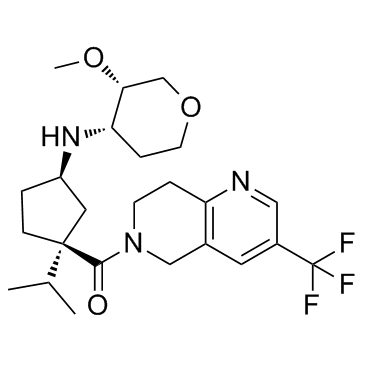624733-88-6
| Name | [(1S,3R)-3-[[(3S,4S)-3-methoxyoxan-4-yl]amino]-1-propan-2-ylcyclopentyl]-[3-(trifluoromethyl)-7,8-dihydro-5H-1,6-naphthyridin-6-yl]methanone |
|---|---|
| Synonyms |
1,5-Anhydro-2,3-dideoxy-3-{[(1R,3S)-3-isopropyl-3-{[3-(trifluormethyl)-7,8-dihydro-1,6-naphthyridin-6(5H)-yl]carbonyl}cyclopentyl]amino}-4-O-methyl-D-erythro-pentitol
((1R,3S)-3-isopropyl-3-{[3-(trifluoromethyl)-7,8-dihydro-1,6-naphthyridin-6(5H)-yl]carbonyl}cyclopentyl)[(3S,4S)-3-methoxytetrahydro-2H-pyran-4-yl]amine CS-0344 MK-0812 N-((1R,3S)-3-isopropyl-3-[[3-trifluoromethyl-7,8-dihydro-1,6-naphthyridin-6(5H)-yl]carbonyl]-cyclopentyl)-N-[(3S,4S)-3-methoxytetrahydro-2H-pyran-4-yl]-amine 1,5-Anhydro-2,3-dideoxy-3-{[(1R,3S)-3-isopropyl-3-{[3-(trifluoromethyl)-7,8-dihydro-1,6-naphthyridin-6(5H)-yl]carbonyl}cyclopentyl]amino}-4-O-methyl-D-erythro-pentitol D-erythro-Pentitol, 1,5-anhydro-2,3-dideoxy-3-[[(1R,3S)-3-[[7,8-dihydro-3-(trifluoromethyl)-1,6-naphthyridin-6(5H)-yl]carbonyl]-3-(1-methylethyl)cyclopentyl]amino]-4-O-methyl- |
| Description | MK-0812 is a potent and selective CCR2 antagonist with low nM affinity for CCR2 on human monocytes. |
|---|---|
| Related Catalog | |
| Target |
CCR2 |
| In Vitro | MK-0812 completely blocks all MCP-1 mediated response in a concentration dependent manner, with an IC50 of 3.2 nM. This value is similar to the potency observed for the inhibition of 125I-MCP-1 binding by MK-0812 on isolated monocytes (IC50 4.5 nM). In fact, the antagonist not only completely blocks the shape change response to exogenous MCP-1, but also results in a monocyte forward scatter measurement below unstimulated or basal levels. The addition of MK-0812 to rhesus blood also inhibits MCP-1 induced monocyte shape change. The IC50 for MK-0812 in whole blood assays is 8 nM[1] MK0812 is a potent and selective small molecule CCR2 antagonist[2]. |
| In Vivo | MK-0812 is administered by continuous i.v. infusion to maintain a constant level of the drug in blood[1]. Administration of MK0812 at 30 mg/kg, p.o. reduces the frequency of Ly6G-Ly6Chi monocytes in the peripheral blood, while no impact on circulating Ly6G+Ly6C+ neutrophil frequency is observed. In addition, MK0812 treatment causes a dose-dependent reduction in circulating Ly6Chi monocytes and a corresponding elevation in the CCR2 ligand CCL2[2]. |
| Kinase Assay | Human whole blood is collected in EDTA tubes and used within 1 h of blood collection. For antagonist treated samples, blood (200 µL) is pre-incubated with MK-0812 (0.1% final DMSO concentration) for 30 min at room temperature. After which, 20 µL of FITC conjugated anti-CD14 antibody and 4 µL of chemokine or buffer is added to each sample and mixed lightly. An aliquot (100 µL) of the blood mixture is incubated for 10 min at 37°C, immediately placed on ice and lightly fixed with 250 µL of ice cold fixative (49 mL PBS, 1.0 mL 4% para-formaldehyde) for 1 min. Red blood cells are lysed by adding 1.0 mL of ice cold lysis solution (0.15 M NH4Cl2, 10 mM sodium bicarbonate, and 1 mM EDTA), and incubated for 20 min on ice. After complete lysis of red blood cells, 100 µL of 4% para-formaldehyde is added and the samples are analyzed by flow cytometry for forward scatter measurements[1]. |
| Animal Admin | Mice[2] Female BALB/c mice are used between 8 and 10 weeks of age. SCH563705 or MK0812 are administered in a 0.4% MC solution by 30 mg/kg oral gavage (p.o.). Two hours later, the frequency of CD11b+Ly6G-Ly6Chi monocytes and CD11b+Ly6G+Ly6C+ neutrophils is determined by flow cytometry. |
| References |
| Density | 1.2±0.1 g/cm3 |
|---|---|
| Boiling Point | 562.0±50.0 °C at 760 mmHg |
| Molecular Formula | C24H34F3N3O3 |
| Molecular Weight | 469.540 |
| Flash Point | 293.7±30.1 °C |
| Exact Mass | 469.255219 |
| PSA | 63.69000 |
| LogP | 2.37 |
| Vapour Pressure | 0.0±1.5 mmHg at 25°C |
| Index of Refraction | 1.538 |
| Storage condition | 2-8℃ |
| Precursor 2 | |
|---|---|
| DownStream 0 | |

![(3S,4S)-N-((1R,4S)-4-isopropyl-4-{[3-(trifluoromethyl)-7,8-dihydro-1,6-naphthyridin-6(5H)-yl]carbonyl}cyclopent-2-en-1-yl)-3-methoxytetrahydro-2H-pyran-4-amine structure](https://image.chemsrc.com/caspic/480/625097-29-2.png)
![((1R,3S)-3-isopropyl-3-{[3-(trifluoromethyl)-7,8-dihydro-1,6-naphthyridin-6(5H)-yl]carbonyl}cyclopentyl)-[(3S,4S)-3-methoxytetrahydro-2H-pyran-4-yl]amine benzenesulfonate structure](https://image.chemsrc.com/caspic/444/851916-43-3.png)